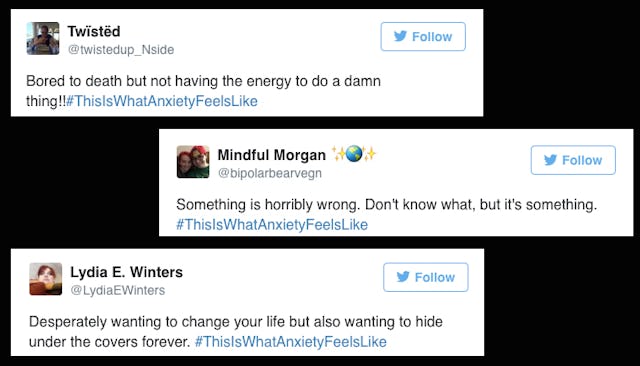#ThisIsWhatAnxietyFeelsLike Nails What It's Like To Live With Anxiety

Sarah Fader started #ThisIsWhatAnxietyFeelsLike to help people feel less alone
Everyone knows what it’s like to feel anxious occasionally. Some people hate flying. Some people get freaked out by heights. We’ve all had that bout of nerves before an important job interview or meeting. But can you imagine what it would be like to regularly have anxious feelings arise, without a definite “cause” to attach them to? When those feelings of anxiety surface, and you have no idea why you’re feeling that way, it can be terrifying. And anxiety is something that a lot of us suffer from.
Sarah Fader is the CEO and founder of Stigma Fighters, a non-profit organization that encourages individuals with mental illness to share their personal stories. She also hosts a podcast, writes a column for Psychology Today, and is just a generally awesome human. And she’s been living with a anxiety and depression for a very long time.
One day when she was suffering with a bout of anxiety, she decided to take to Twitter “to open the floor up for other people to share their stories about what anxiety feels like to them.” #ThisIsWhatAnxietyFeelsLike was born.
And the tweets began rolling in. Nearly two months later, they still are.
“I have chronic anxiety. And one night when I started to have those feelings, I wanted to release that energy into the void,” she explains to Scary Mommy.
“The floodgates opened and the anxious thoughts started rolling in. It was inspiring to know that I am not alone in the way that anxiety overwhelms me,” Fader wrote in The Huffington Post. “Anxiety affects people in a variety of different ways. It was refreshing to read about people’s experiences with anxiety.”
Generalized Anxiety Disorder affects 6.8 million adults or 3.1 percent of the U.S. population. “People with the disorder, which is also referred to as GAD, experience excessive anxiety and worry, often expecting the worst even when there is no apparent reason for concern,” explains the Anxiety and Depression Association of America. “They anticipate disaster and may be overly concerned about money, health, family, work, or other issues. GAD is diagnosed when a person finds it difficult to control worry on more days than not for at least six months and has three or more symptoms.”
Allie Burke is the Executive Director of Stigma Fighters, a columnist for Psychology Today, and a close friend of Fader’s. In her post, There Is Not A Right Way to Exist, she writes, “I’ve had my own bout with anxiety and depression when I was first diagnosed with schizophrenia… I remember. I remember being uncomfortable in my own brain and seeking out the brains of others for comfort and solace, in a totally non-zombie way.”
That’s exactly why things like this hashtag are so effective. People need to know that they are not alone — that the conversations happening in their brains happen in the brains of others, too. It’s why continuing to speak about anxiety, depression, and mental illness is so important.
There will be a reading of the Stigma Fighters Anthology at NYU Bookstore on Wednesday, May 31 at 6pm. If you’d like to donate to the effort to fly writers into NY to read their own essays, you can visit the funddreamer page.